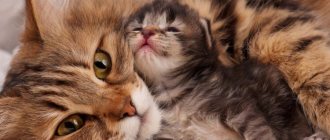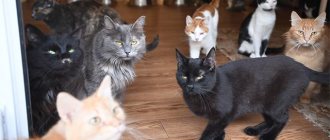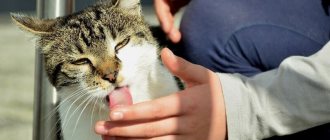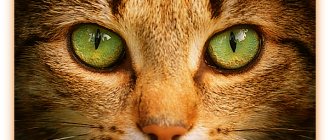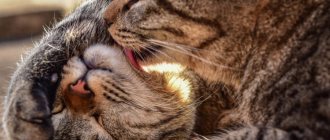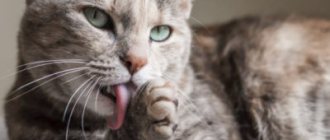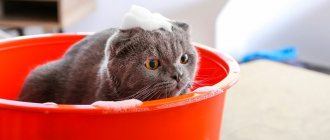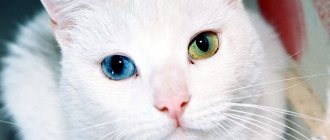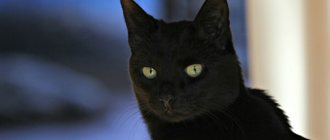Owners of domestic cats who have several pets at once often note that their pets lick each other. This behavior of cats causes emotion in humans, but the question also arises of why animals behave this way.
From a human point of view, such a manifestation of feelings means affection. Animal psychologists still have not given an exact answer why cats lick each other, because this is not only a manifestation of love, everything is much more complicated. Such licking is characteristic not only of cats, but also of monkeys, as well as wild felines.
The cat licks the cat
Owners of domestic cats who have several pets at once often note that their pets lick each other.
This behavior of cats causes emotion in humans, but the question also arises of why animals behave this way. From a human point of view, such a manifestation of feelings means affection. Animal psychologists still have not given an exact answer why cats lick each other, because this is not only a manifestation of love, everything is much more complicated. Such licking is characteristic not only of cats, but also of monkeys, as well as wild felines.
The Importance of Licking for Cats
First of all, cats licking each other means that they get along well with each other. This is a kind of manifestation of the social connections that have arisen between them. Such tenderness will not be shown to other cats that are not part of the pack. For example, a mother cat licks her kittens from birth. This habit may remain later, indicating a special connection between mother and kitten, even if it is already grown up.
Careful care of the coat is inherent in cats at the genetic level. Wild cats always licked their fur in order to remove foreign odors that would interfere with the upcoming hunt.
Licking each other's fur helps improve the process of thermoregulation. If the coat is clean and fluffy, air microcirculation is much better, making it possible to keep warm air out in hot weather and keep warm in cold weather.
Animal psychologists claim that cats occupying the highest status in the hierarchical level indicate their dominance by licking individuals of a lower rank. It is important to note that such behavior is much better than fighting.
Why cats can lick each other
The domestic cat, being the ancestor of its wild relatives, represents a true standard of self-sufficiency. Cats show no interest, showing their indifference. Animals are true loners, intersecting with their relatives only when absolutely necessary. But this is only relevant for cats living far from humans. In the course of selection and evolution, domesticated cats began to show more attention to their relatives. Such a change is inherent only in the psychology of cats, getting what they want in any way.
Cats communicate with each other using various gestures, also using smells, sounds, looks and tactile contact. It is mutual licking that refers to friendly signals transmitted from animal to animal.
There are several explanations for such licking:
- Exchange of scents. By licking their relatives, cats transmit body scents. This allows you to become related, and quickly makes it possible to distinguish a stranger from your brother-in-law. The skill of licking each other is very valuable for cats living in outdoor conditions. At home, the skill is practically not needed.
- Dominance. If an owner notices their pets licking each other, this may indicate an attempt to indicate place in the hierarchy. Cats gently hint who is in charge and who needs to obey.
- Maternal feelings. The manifestation of maternal feelings occurs from a very early age, when small kittens need the affection and care of their mother cat. During this period, the mother cat monitors the cleanliness of the coat. With age, if the kittens remain with their mother, this kind of care remains for a long time.
- Marking who is yours and who is a stranger. By licking each other, cats mark their relatives. If a new pet appears in the house, cats begin to actively sniff and lick their relative. This is how a kind of acquaintance occurs.
Basically, a cat that licks pays attention to such places as the cheekbone area, the scruff of the neck and the crown of the head. In addition to getting to know each other, cats show care for each other by grooming their fur.
Obeying the basic instinct
The periods of cat “weddings” are known for their riotousness - and individuals of both sexes are prone to an enchanting outpouring of feelings. Expressing desire with inviting cries, characteristic poses and “fragrant” marks, but not being able to find a partner, temperamental pets can “trample” with their paws or bite the owner, lick him annoyingly and rub his whole body, marking him with his smell.
Cats sometimes imitate mounting and mating by squeezing a person's hand with their teeth, just as they would grab the scruff of a cat in heat.
Cat licks dog
As for the question of a cat licking another cat, it becomes clearer. But how can we explain the behavior of a cat when it licks a dog? Some owners notice that the cat rubs its muzzle and body against the dog. First of all, this is a kind of markup.
There are specific glands in the corners and around the cat's mouth. They are also located in the temporal region. During friction, the glands open, and a specific secretion remains on the object that the animal rubs against. Glands are also located at the base of the tail.
An interesting fact, proven by animal psychologists, is that cats that feel stronger in the hierarchical ladder lick the weaker ones, proving their dominance. A cat can also lick its owner in response to stroking, thereby showing their gratitude.
Help with grooming
Moreover, cats often “ask” their neighbors to help them with grooming. Usually these are parts of the body that are difficult for them to reach.
Have you noticed that people mostly pet and scratch cats on the head or neck area? These are the places that cats most often help each other lick. That is why, if a person begins to stroke other parts of his pet’s body, this often causes discontent and aggression. Scientists working on this issue also came to this conclusion.
What happens if a mother cat licks her kittens too hard? Mother pest.
It is generally accepted that a mother cannot harm her children, however, this is not true. Sometimes a cat, confused by the hormones bubbling in her blood, begins to “be a mother” too hard, licking and feeding the babies until she is exhausted or until her own children are completely traumatized, as in our case.
During the first weeks, the mother cat, licking the kittens, stimulates their digestion, peristalsis, massaging the tummy while licking, as well as urination and defecation, eating all the waste products of the babies (that’s why the cat’s house is always clean).
Some cats are not very diligent in caring for their babies, so experienced breeders have a method - spread butter under the kitten’s tail - its smell and taste will help the cat “trigger” the desired instinct.
A cat's tongue is very rough. It is programmed by nature to separate meat from bones, since the cat is a predator. Therefore, when a mother cat starts licking her babies too fanatically, this can lead to injuries to the skin and mucous membranes - she simply “erases” them like sandpaper.
In the photo there is a two-week-old Sphynx kitten, whose penis has been almost completely erased due to such “care” and this baby can only be saved by an operation - urethrostomy, which will widen his urethra so that he can simply pee. Without surgery, he will die from bladder overflow and, as a result, acute renal failure, like cats with urolithiasis.
In less severe cases, when the ability to urinate is preserved, the urethra is bougienage, washed, treated with Miramistin and antibiotic therapy, which sometimes makes it possible to do without surgery.
Sphynx cats most often suffer from this type of excessive licking, but it can also occur in other breeds. Check your babies daily! It is better not to use cat mothers prone to such things in future breeding work, since these behavioral deviations can be passed on to offspring.
Do cats have Rh conflict and why kittens can die suddenly - read here!
And about what to do if your cat doesn’t have enough milk - here!
Subscribe to our channel or share on social networks if you found our article useful or interesting!
Source
The cat licks the walls
On veterinary forums, cat owners are interested in questions: “Why did the cat start licking the walls and floor?”, “What to do if the kitten licks surfaces and eats inedible objects?” Indeed, it is almost impossible not to notice that a cat is licking the floor, concrete walls, wallpaper, sofa or gnawing on stones. Incorrect behavior of a pet is accompanied by anxiety, nervousness, or vice versa, the cat becomes very affectionate. Let's try to figure out what causes this condition of the furry pet.
What to do
The exact treatment will depend on the underlying cause.
Recommendations may include:
- Treat any abscess in the area with drainage, antibiotics, and pain medications.
- Identifying anal glands if they are affected, or treating anal gland infections if necessary.
- Prescribing antibiotics for dermatitis, vaginitis or urinary tract infections.
- Catheterization of cats with urinary tract obstruction
- Surgery (cystotomy) or dietary treatment for bladder stones.
- Sterilization surgery for uterine infections (pyometra) or fetal retention.
- Mass removal of tumors.
- Fluid therapy to correct dehydration, as well as anti-inflammatory and pain medications as needed, and other treatments deemed necessary based on clinical signs.
why does a cat lick what does a cat do - why does a cat lick Why do cats lick a neighbor's cat the cat's rises The cat's hair is perceived by which the cat Cats can find out why the cat is asking why Let's figure out why this is so
whybreedslickingloveneedattentionresponsearticlemanifestationoflifeinterestingyearshealthhomecomment thanemailillnessbacksiteonlyshelterveinsnews
Why does a cat lick the floor and walls?
If a cat licks walls, concrete surfaces, wallpaper, or eats chalk with pleasure, the reason should be sought in functional system failures in the body, which are provoked by the deterioration of the furry pet’s health. As a rule, this behavior of cats is provoked by a deficiency of macro-microelements in the animal’s body.
If a cat begins to lick the floor, the wall is littered with marks from the cat’s teeth; one of the possible reasons is hypocalcemia. Characterized by a violation of phosphorus-calcium metabolism. The disease develops due to a deficiency of calcium and vitamin D3.
Hypocalcemia worsens in females during pregnancy and lactation. In kittens - during a period of intensive growth and development.
When a cat wants to lick the walls, some of the reasons for this condition include::
- hypovitaminosis;
- endocrine pathologies;
- metabolic disorder;
- gastrointestinal diseases;
- helminthic infestations;
- unbalanced diet;
- liver problems.
If a cat licks the floor, concrete, walls, tiles, another common cause is anemia, which develops in animals against the background of iron deficiency. In this condition, the mucous membranes turn pale, the cat looks depressed, lethargic, and the digestive processes in the body are disrupted.
Note that anemia can be a symptom of viral and bacterial infections and diseases of various etiologies . Therefore, if you notice uncharacteristic behavior of your cat or symptoms indicating deterioration in health, take your pet to the veterinary clinic for an examination.
Other reasons
If a cat begins to lick the floor, peels off wallpaper, but the pet is active and feels normal, perhaps the animal is doing this out of boredom, attracting the owner’s attention. In some cases, an affectionate cat becomes aggressive towards members of its family or, on the contrary, caresses, constantly licks the hands and face of the owner.
If the cat eats inedible objects, behaves inappropriately, attacks of aggression are replaced by a depressed state, we recommend checking the cat for rabies. This behavior is observed in pseudorabies (Aujeszky's disease), a nervous form of plague.
The risk of contracting dangerous infections increases in unvaccinated cats that walk outside and may come into contact with stray animals.
Stress, nervous shock, anxiety are common causes of compulsive-obsessive behavior in animals..
Licking as a way to calm down
Animal psychologists have long noted the ability of four-legged animals to self-soothe . The cat's body is covered with hair, each hair grows from a follicle, to which nerve endings approach. Stroking is pleasant for the cat, since the contact of the hand with the fur simultaneously stimulates hundreds of nerve endings.
Animals tend to lick themselves when they feel anxious. Trying to relieve discomfort, the cat makes a lot of effort and licks itself with some “frenzy.” Lick granuloma in dogs and cats is the result of constant stress. The animal is so worried that it literally licks the fur and skin from its limbs. In advanced cases, bone can be easily seen in the affected area.
Help, treatment
First of all, review your pet's diet. If your cat is kept on a natural diet, supplement the diet with complex vitamin and mineral supplements.
When feeding with ready-made food, give preference to “premium” and “extra” class products. Choose food taking into account the age and breed characteristics of your pet.
If, after adjusting the cat's diet, the kitten still licks the floors and walls, seek help from a veterinarian.
If a cat licks the floors due to nervousness, sedatives and anxiolytics prescribed by a veterinarian will help. Protect your cat from stress, pay more attention to the cat.
If you suspect infection with viruses or bacteria, take your cat to a veterinary clinic for examination. Remember, many diseases are easiest to treat in the initial stages of their development.
Source
Why does a cat lick a kitten?
Small animals can sometimes be very funny, so it is interesting to observe the behavior of pets. Of course, their actions need to be corrected. Especially if you are raising a kitten. Large pets can also behave incomprehensibly, puzzling the owner. The cat's actions can be so funny that owners don't have to lose heart. But the reasons for your four-legged friend's actions may remain unclear. Does your pet manage to lick your hands and face? Let's think about why the cat does this.
Communication between cat and owner
Our pets are loyal and open to communication. And if you want to find yourself a loyal friend who will simply be nearby and give you good emotions, get an animal. But now I would like to talk about an interesting phenomenon in the behavior of cats. You've probably seen a cat lick a person's hands or face. There are reasons for this:
- Your pet wants to show you love. While humans can express feelings through words or hugs, cats have other methods. This behavior is instinctive, and later we will look at why the pet exhibits it. You may already understand what we're talking about. But for now let's move on to the next point;
- Each animal has its own territory and “its own owner.” Therefore, with this behavior, the cat simply designates you as a member of the family. There is another option, when the pet does not perceive the owner as the main one, but, on the contrary, tries to clean it like a junior;
- You are in a bad mood and your pet wants to feel sorry for you. The cat also reacts to its stress. If you notice that your four-legged companion spends a long time cleaning himself, it could be stress. Or dermatological problems. But if an animal likes to lick a person, then she wants to comfort you.
No matter how rough your pet’s tongue is, you should always accept his affection and care. After all, this is how your pet expresses her feelings, wants to distract you from negative experiences, and feel sorry for you. There are other reasons, for example, the desire to get a treat. But even in this case, the animal shows sincere love for you. Why a cat likes to lick a person’s hands is a rather broad question. To understand your pet, you need to observe and communicate with him. Each animal has its own unique character. Yes, and a person influences the behavior of a pet. We talk about his actions, parenting methods, reactions to pranks and satisfaction of food needs.
There is no doubt that felines can be very smart and funny at the same time. And in their behavior you can find care for a person, their owner. Where there is a cat, there is an opportunity to console yourself and enjoy pleasant communication with the animal.
To maintain cleanliness
Self-licking is a natural and very common mechanism for caring for one's own body in the animal kingdom.
Kittens begin to lick themselves from the age of four weeks, and before that, all manipulations regarding the infant toilet are performed by the parent.
Cat licking rituals like these are a demonstration of love for cleanliness:
- The cleanest . Sometimes it seems that keeping oneself clean is the main task of a feline brother. Taking the most graceful poses, Murka licks herself for hours, touchingly washes her face with her paws and rubs her ears. She does this many times a day: after sleeping, feeding, taking care of her natural needs, and even stroking her. A cat's tongue, covered with miniature hooks and therefore rough to the touch, combs and arranges hairs like a brush, removing dirt and foreign odors. During this massage, blood flow is stimulated and the skin glands intensify the production of an oily secretion, which lubricates the hair and protects it from moisture.
- “No” to foreign odors . The desire to lick a person may be motivated by the desire to destroy unusual scent marks. According to the cat's understanding, all perfumes, including perfumes, soaps, shampoos and creams, have unnatural and even unpleasant odors, which must be urgently gotten rid of. This is why the cat spends so much time and carefully licking its own area of the body with medicinal ointment applied to it.
- Tempting aromas . Some cosmetics, on the contrary, can be very attractive to mustachios. Such, for example, is a hand and nail cream with an extract of medicinal valerian, which has a magical effect on cats and activates the owner’s obsessive licking. Some cats love the smell of peony tincture and therefore tend to lick the hands or lips of a person who has taken this sedative. Cats are also attracted to human sweat, which contains odorous substances similar to animal pheromones. So the owner, returning from a morning jog or after a hard work shift, smells very attractive to the murka.
Licking kittens and humans: what are the similarities?
It is not without reason that a cat shows care by licking. Even in childhood, your mother cat took such care of your pet. This action is associated with pleasant emotions that are associated with safety and protection. Have you noticed how a cat licks kittens? In fact, there is something similar in the behavior of a pet with a person. Cat love manifests itself in different ways, but it is through licking that the mother takes care of the kitten. She hides him from predators by licking his scent, and also teaches him to care for her fur. But even in the usual washing of children, the cat shows maternal affection.
Licking is associated with higher rank
Another, earlier study found that in most cases, higher-ranking cats groom lower-ranking ones. In this case, most often those animals that are licked sit or lie, while those caring for them take higher positions - standing or sitting upright. A cat, without resorting to fights and other aggressive actions, can show its dominance by licking another.
How does a cat become domestic and loyal?
The first few days of your interaction with your cat can affect subsequent trust. A small animal must adapt after moving to a new home. And if this is also a new owner, especially after weaning from the mother, then you have to work a little with the baby’s sense of security. Comfort and trust are closely related. And at the very moment the kitten meets a new person and the first few weeks, the owner is responsible for the emergence of a trusting relationship. If at an older age you observe licking the owner’s hands, then your cat has gone through the adaptation process well and an emotional attachment has arisen. Sometimes it can be quite difficult to win over a pet, but many owners still succeed. The most important thing is to treat the animal well.
Maybe maternal instinct is involved here
At first, little kittens are defenseless and inept, and therefore rely on their mother for everything, including in the matter of bathing. Licking in this case is a sign of affection and protection from the mother. But by the age of 4 weeks, kittens can bathe themselves and spend more than 50% of their waking time maintaining cleanliness.
Is your cat sick?
There is also some not entirely pleasant information about why cats lick themselves and their owners. According to one version, the cat reacts with this behavior to skin diseases or parasites. In order to accurately determine whether there is any need to worry, the animal must be examined by a doctor. Beforehand, at home, you can identify whether there are reasons to worry. Rashes, dermatitis, and lichen will be noticeable. But to find out whether there are worms, monitoring the cat’s appetite, its well-being and feces will help.
You will be able to notice from the behavior of the predator what the mystery of this phenomenon lies. When she licks her owner's hands, she can do it with love or confusion. Observe your pet's behavior. Perhaps she just wants to show how she feels about you.
At what age can a cat give birth to kittens?
Puberty in a cat
occurs between 4 and 12 months of age.
This variation is directly related to the breed: short-haired cats
(Siamese, Abyssinian and others) mature earlier than others, by about six months, but long-haired cats, like Persians, fully develop only by one year.
Interesting materials:
How does a teaching method differ from a teaching form? How is the monastery different from the Lavra? How do moral standards differ from those written in laws? How does municipal government differ from state government? How is the new nobility different from the old? How is obstructive bronchitis different from regular bronchitis? How does an orthopedist differ from a traumatologist? How does primary school differ from secondary school? How does an individual differ from a species? How does the Patriotic War differ from the World War?
What other reasons for licking?
Another option is if the cat is licking itself just to keep itself busy. Let's say it's raining outside or the owner is constantly busy. In the second case, try to pay attention to your pet, because a cat can lick itself if it wants to feel calm. For large or small pets, the care and affection of the owner is extremely important. You can replace a family for kittens and therefore you should try not to offend them.
We have looked at the most common reasons why a cat licks its owner. This behavior expresses natural instincts, as well as the predator’s care for herself and her younger kittens. If a pet licks its owner, it trusts him. You need to maintain communication with your pet as often as possible. Otherwise, small predators may lick themselves out of boredom.
The pet can also lick its hair. The reasons may be the desire to give or receive attention, the desire for care or dominance. Some owners of furry cats say that the cat may begin to zealously wash away the “dangerous” smell of shampoo, trying to save the owner. As you can see, even toxic substances on the hair sometimes do not become an obstacle.
Pay attention to whether you have recently eaten meat, fish or other tasty food. If the smell remains on your hands, the cat will feel it and lick it off. But here there are two explanations. In the first case, the animal wants to eat. In the second, she hides you and herself from danger. In nature, such a smell could be smelled by predators.
